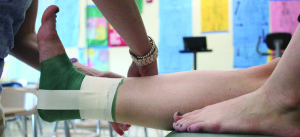For many high school athletes, their athletic career begins at age four with Little League t-ball or recreational soccer and basketball. The athletes fall in love with the sport at an early age, and many dream to play in college. However, according to CBS News, only 2 percent of high school athletes end up playing in college and receiving a scholarship. The probability of being able to play in college is already slim; add getting injured during high school, and the dream of playing in college disappears.

One of the first injuries that occurred this year affected senior Conner Leinbach, who was injured during the football season. Before his injury, Leinbach hoped to play baseball in college for either a small Division I school or a Division II school. However, his injury has caused a change in his plans.
“I was not able to play any fall baseball or work out in the winter for baseball,” Leinbach said. “It hampered my ability to be recognized by colleges at that time.”
Senior Jazmine Atkins tore her anterior cruciate ligament (ACL) this year in her right knee. Atkins believes that if she were not injured, she would have had the opportunity to play basketball for a Division I college.
Atkins has verbally committed to Converse College, a Division II school located in Spartanburg, South Carolina. Verbally committing is a nonbinding agreement, which allows for both the athlete and the school to back out of the agreement.
“My injury held me back, because I was not able to get the exposure that I needed to reach out to college coaches, and it is also a really hard commitment for rehab and getting back properly,” Atkins said.
Senior Cole Walker tore a medial collateral ligament (MCL) and dislocated his kneecap during last year’s football season. Walker, a defensive end, was looking to play at Campbell University, Wingate University, East Carolina University or Appalachian State University before he was injured.
“I had to tell all the college coaches that I could not play, and it was awful,” Walker said.
Leinbach described his injury as the most pain he has experienced in his life.
“When I first fell, I was in a pile of people, and my leg hurt really bad,” Leinbach said. “Then I looked down, and my leg was sideways. It was really painful.”
Walker explained how he felt when he was first injured.
“It was the worst pain in the world,” Walker said. “I feel like tearing my MCL was worse than breaking a bone. It was the worst pain of my life. I cried in the doctor’s office after they told me what my injury was.”
Leinbach reflected on how his injury will impact his future.
“It made me think about how important sports are to me,” Leinbach said. “They are important to me, but it is not the only thing that I want to do.”
After Walker’s injury, he believes that he needs to be more careful while playing football and “always be prepared for whatever comes at [him].”
Atkins explained how her injury has affected her life.
“I’m grateful that I had this injury even though it was a long and hard process, because it taught me a bunch of life lessons,” Atkins said. “I still love the game. Tearing my ACL has made me love the game even more, because it gave me a different perspective. All the hard work that I had to go through made me not take playing basketball for granted.”
Walker described the implications and long-term effects of his injury.
“I cannot run full speed anymore, and it is difficult to get up steps,” Walker said. “I’m going to be limping around for the rest of my life and have a knee problem.”
Leinbach’s football injury has made him tentative to move on his injured leg while playing baseball.
Varsity baseball coach Rick Parks commented on how Leinbach’s injury has affected his final season playing baseball for Northwood.
“Any setbacks aren’t ideal, and they create adversity, and we have to overcome those challenges,” Parks said.
Atkins said her injury has made her stronger mentally and that she can take on a lot more than she used to. Tearing her ACL has taught her to “never give up on something you believe in.”
– By Sarah Helen Shepherd
